Is India Still a Democracy?
Narendra Modi has hollowed out institutions and targeted opponents, all the while sowing interethnic tensions.
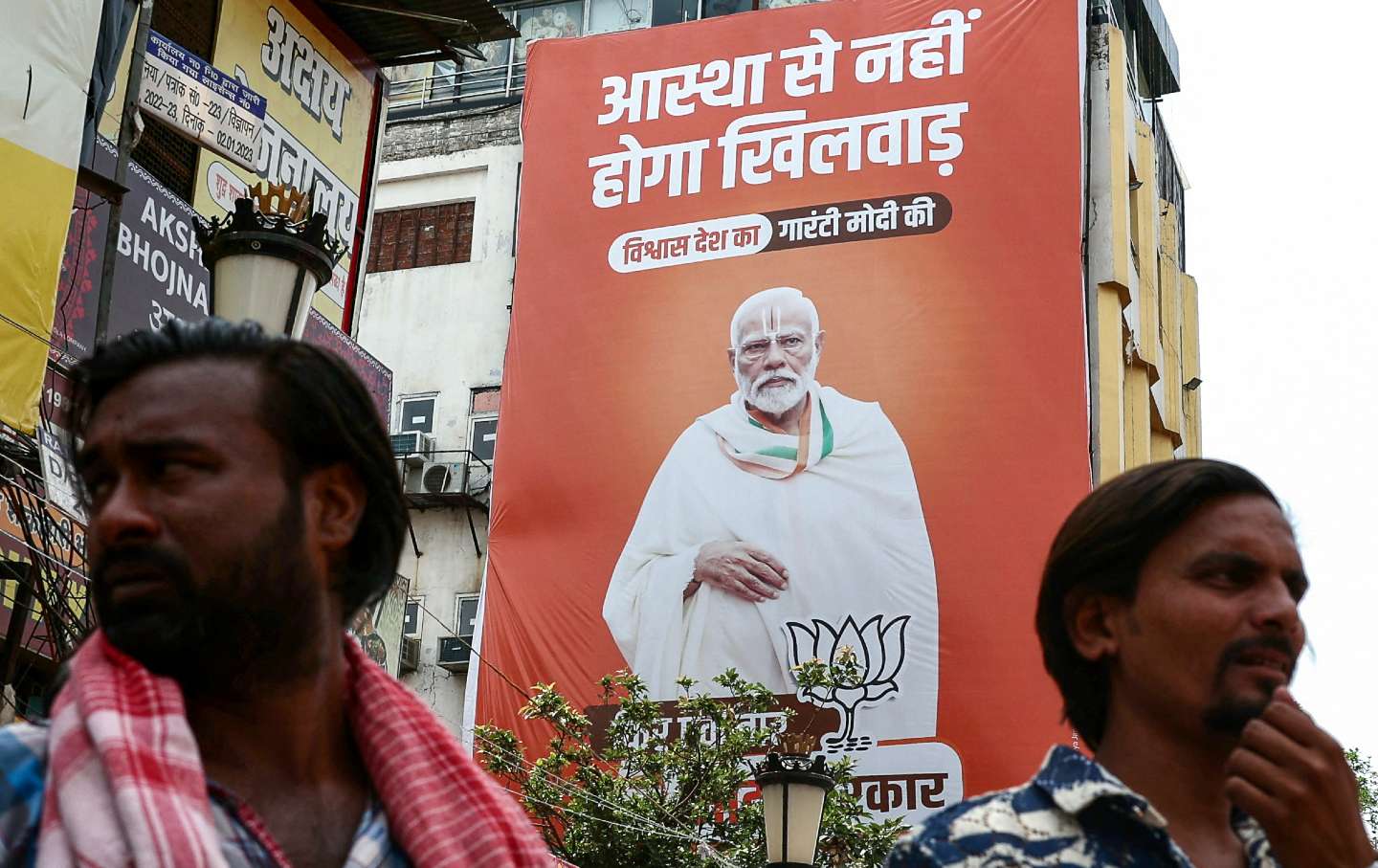
Men stand in front of an election campaign hoarding of the Bharatiya Janata Party featuring Indian Prime Minister Narendra Modi, in Varanasi on April 10, 2024, ahead of India’s upcoming general elections.
(Niharika Kulkarni / AFP via Getty Images)
Narendra Modi’s electoral success in Gujarat between 2001 and 2014 and on the Indian scene since then stems from his novel blend of populism and Hindu nationalism (Hindutva). Hindutva grew out of the Rashtriya Swayamsevak Sangh (National Volunteer Organization, RSS), a paramilitary-style nationalist group founded in 1925 to bulk up young Hindus both physically and morally so they could stand up to Muslims, who were depicted as a danger to the majority.
Modi joined the RSS as a child and devoted his life to it, pursuing no other careers and even living apart from his wife. He rose through the ranks, eventually becoming the chief minister of Gujarat (his home state) in 2001. The following year, he oversaw an anti-Muslim pogrom that left some 2,000 dead— a strategy of religious polarization that won him the December 2002 regional elections. Similar successes in 2007 and 2012 made Modi the obvious prime ministerial candidate for his Bharatiya Janata Party (Indian People’s Party, BJP) in 2014.
But he left behind the RSS tradition of collective decision-making, putting himself front and center and striving to connect directly with “his” people. Rather than relying on the activist network, Modi held rally after rally where he showcased his flair for speechmaking. He also founded his own television channel, worked social media, and employed a revolutionary strategy: using holograms to simultaneously lead one rally in hundreds of places. Modi even distributed masks printed with his likeness to deepen supporters’ identification with him. In short, he saturated the public arena so as to embody the masses—a task made easier by his low-caste origins, on which he has built a complete narrative. (He worked as a teaboy in his father’s shop.)
However, the “masses” meant only the Hindu majority, which he was busy stirring up against one target in particular: Muslims. As in the 2014 elections, in 2019 “Moditva”—Modi’s idiosyncratic hybridization of right-wing nationalist ideology, Hindutva and a personality cult—triumphed on the strength of BJP landslides in the north and west. This success allowed him to bend to his will both the RSS and the BJP—whose MPs had ridden to victory on his coattails—fashioning a government of faithfuls and a parliament of yes-men.
The other institutions soon succumbed too—even the Supreme Court, once a beacon of independence. In the summer of 2014, Modi advanced a constitutional reform that would have changed the appointment process for judges, until then picked by a collegium of peers. His co-optation, opposed by the entire political class, would have replaced the collegium with a five-member commission. The Supreme Court eventually declared the amendment unconstitutional, but Modi still got his way: Of the nominees submitted by the collegium, his government finalized appointments only for those he liked. The court thus resigned itself to proposing candidates who were apt to please him.
Hindutva and its cronies
Society, meanwhile, was undergoing a similar process of enforced conformity, especially in higher education, despite India’s reputation for creativity and intellectual vitality. Public universities were under the thumb of vice-chancellors invariably chosen from among members or supporters of the Hindu nationalist current. Funders (mostly from the business world) of private institutions were pressured, and they in turn pressured the faculty: Industrialists cannot afford to antagonize those in power.
Dozens of subtle maneuvers brought the opposition to its knees. Most often, members of the Indian National Congress or regional parties would be intimidated via tax adjustments or police investigations based on shaky pretexts. The objective? To draw rivals away from their political affiliations and toward the BJP. A valuable catch would sometimes be rewarded with a ministerial position or an easy job. Those who resisted the carrot felt the sting of the stick, typically in the form of charges that could mean prison (the chief minister of Delhi, Arvind Kejriwal, was imprisoned last month) or a freeze on their party’s funds (the case for several Congress party bank accounts since February).
Despite the prime minister’s autocratic tendencies, his government has continued to hold elections. Other similarly disposed countries—think Recep Tayyip Erdoğan’s Turkey or Viktor Orbán’s Hungary—have done likewise. Elections have two major upsides. First, a country can claim to be a democracy (India is the “world’s largest,” according to Western leaders). Second, elections offer a cover of legitimacy to Modi: The people’s mandate justifies weakening all other power centers, especially those that uphold the rule of law. How could the judiciary system defy a leader who embodies the people? Legitimacy wins out over legality.
For Modi, running for reelection is a calculated risk. Regulatory institutions are shadows of their former selves: The electoral commission, which caused many a headache for prime ministers past, has become compliant, as its civil servant leaders face the same pressures as political opponents. For example, although it is illegal to campaign on religious arguments, it would now be unthinkable to punish a BJP leader for doing so.
What’s more, Modi knows he can outspend any rival. BJP expenditures reportedly reached around $3 billion in 2019, equivalent to those of all other parties combined. This financial heft was made possible by a law his government passed in 2017 that keeps donors anonymous through “electoral bonds,” a system declared unconstitutional by the Supreme Court this year, in its most significant challenge to the government since 2015. Even if this system were eliminated, the BJP would still benefit from other private funding channels—not to mention the vast sums the government collects from the public sector to finance its campaigns.
Private-sector money comes primarily from a handful of oligarchs. In exchange for significant advantages, these tycoons help fund the government and back it in the press, which they are slowly taking over. New Delhi Television, the last mainstream TV channel still brave enough to criticize Modi, was acquired in 2022 by Gautam Adani, and some highly popular journalists resigned as it morphed into his mouthpiece. Overall, TV channels and media companies have self-censored to avoid the tax officials and police.
The making of a deeper state
Popular
“swipe left below to view more authors”Swipe →At grassroots level, the Hindu nationalist movement relies on a network of disciplined activists trained by the RSS. As “vigilantes,” they primarily act as a sort of local cultural police, and Muslims are their favorite targets. Muslim men are barred from fraternizing with young Hindu women in public or on campus, in the name of combating “love jihad” (a supposed strategy to seduce them, persuade them to convert to Islam and then marry them). Muslims are sometimes pressured to (re)convert to Hinduism, banned from mixed neighborhoods—causing increased ghettoization—or pursued on highways in the north when they are suspected of transporting a cow (sacred in Hinduism) to the slaughterhouse. This form of vigilantism sometimes leads to lynchings that are filmed and posted on social media.
Guided by the Hindu nationalist movement, these activists work hand in hand with the party-state that the BJP is becoming, to create a deeper state that penetrates society. Vigilantism indeed offers the state unprecedented societal reach: Cultural order is enforced not just by the administration but also by activists who serve as proxies for those in uniform. The only difference is their attire.
Given this transformation of the public sphere, how different would things really be for minorities if the political pendulum were to swing? If elected, the opposition could reverse BJP laws, but what power would it have to keep self-proclaimed defenders of Hinduism from policing the streets? Legitimacy may continue to sideline legality for as long as the Hindu majority remains swayed by the dogmas that the BJP has effectively made mandatory.
We cannot back down
We now confront a second Trump presidency.
There’s not a moment to lose. We must harness our fears, our grief, and yes, our anger, to resist the dangerous policies Donald Trump will unleash on our country. We rededicate ourselves to our role as journalists and writers of principle and conscience.
Today, we also steel ourselves for the fight ahead. It will demand a fearless spirit, an informed mind, wise analysis, and humane resistance. We face the enactment of Project 2025, a far-right supreme court, political authoritarianism, increasing inequality and record homelessness, a looming climate crisis, and conflicts abroad. The Nation will expose and propose, nurture investigative reporting, and stand together as a community to keep hope and possibility alive. The Nation’s work will continue—as it has in good and not-so-good times—to develop alternative ideas and visions, to deepen our mission of truth-telling and deep reporting, and to further solidarity in a nation divided.
Armed with a remarkable 160 years of bold, independent journalism, our mandate today remains the same as when abolitionists first founded The Nation—to uphold the principles of democracy and freedom, serve as a beacon through the darkest days of resistance, and to envision and struggle for a brighter future.
The day is dark, the forces arrayed are tenacious, but as the late Nation editorial board member Toni Morrison wrote “No! This is precisely the time when artists go to work. There is no time for despair, no place for self-pity, no need for silence, no room for fear. We speak, we write, we do language. That is how civilizations heal.”
I urge you to stand with The Nation and donate today.
Onwards,
Katrina vanden Heuvel
Editorial Director and Publisher, The Nation
More from The Nation
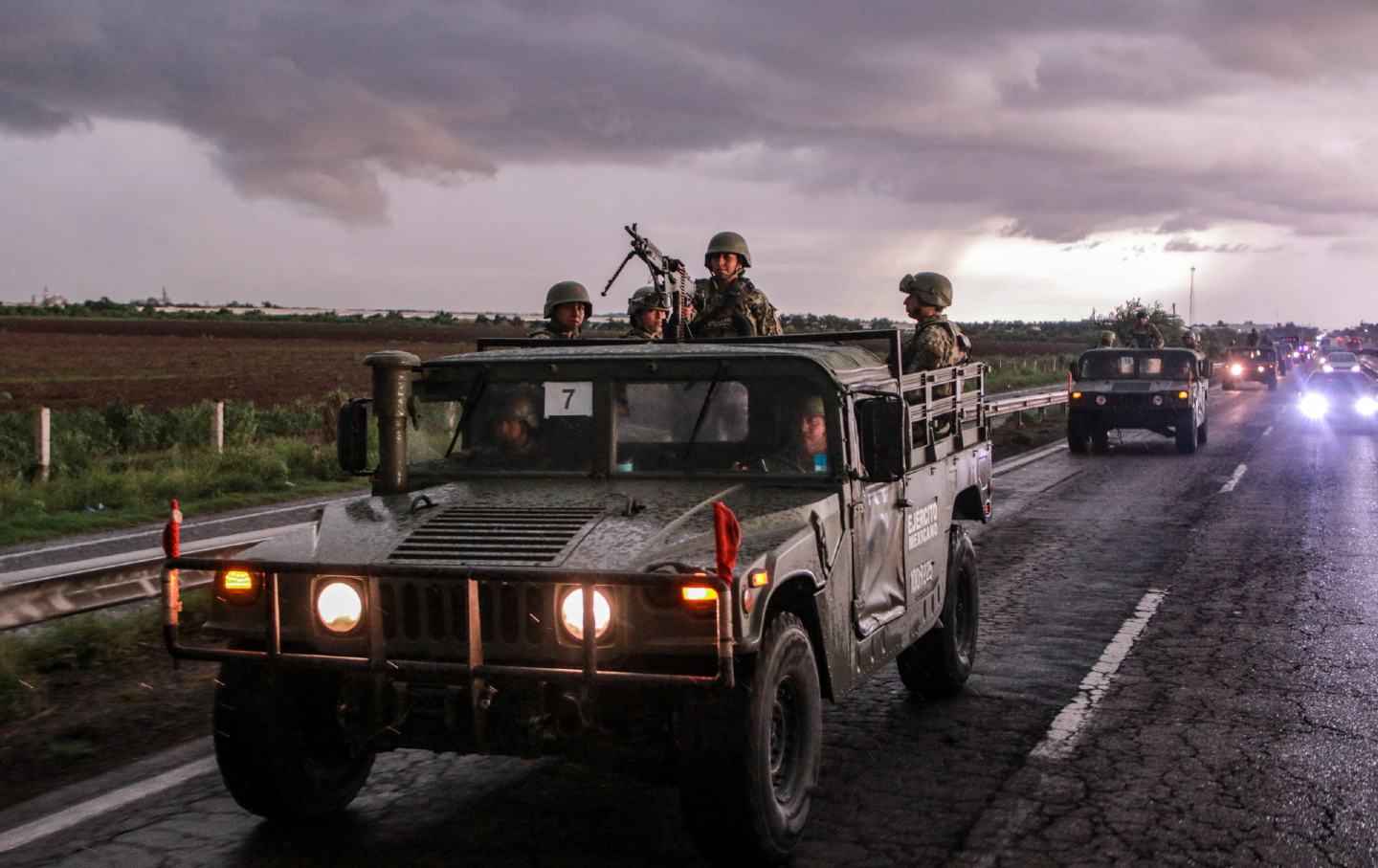
With Trump in the White House, Can Mexico Avoid Making the Drug War even Bloodier? With Trump in the White House, Can Mexico Avoid Making the Drug War even Bloodier?
Mexico’s new president, Claudia Sheinbaum, has a plan to combat drug trafficking, but she has a problem: Donald Trump.
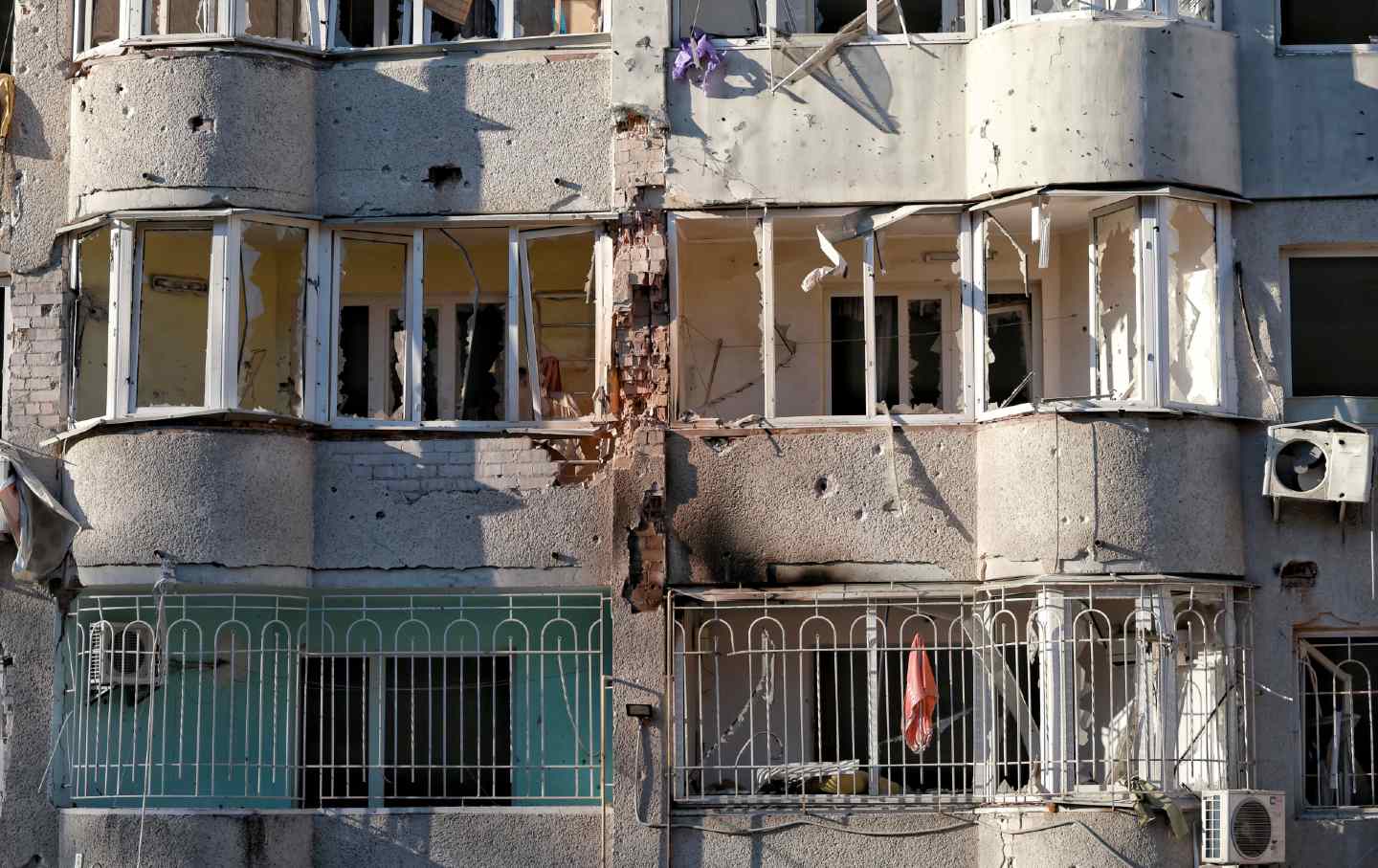
Biden’s Mindless Escalation Is a Final Betrayal of Ukraine Biden’s Mindless Escalation Is a Final Betrayal of Ukraine
Instead of preparing for inevitable negotiations, the outgoing president adds fuel to the fire.
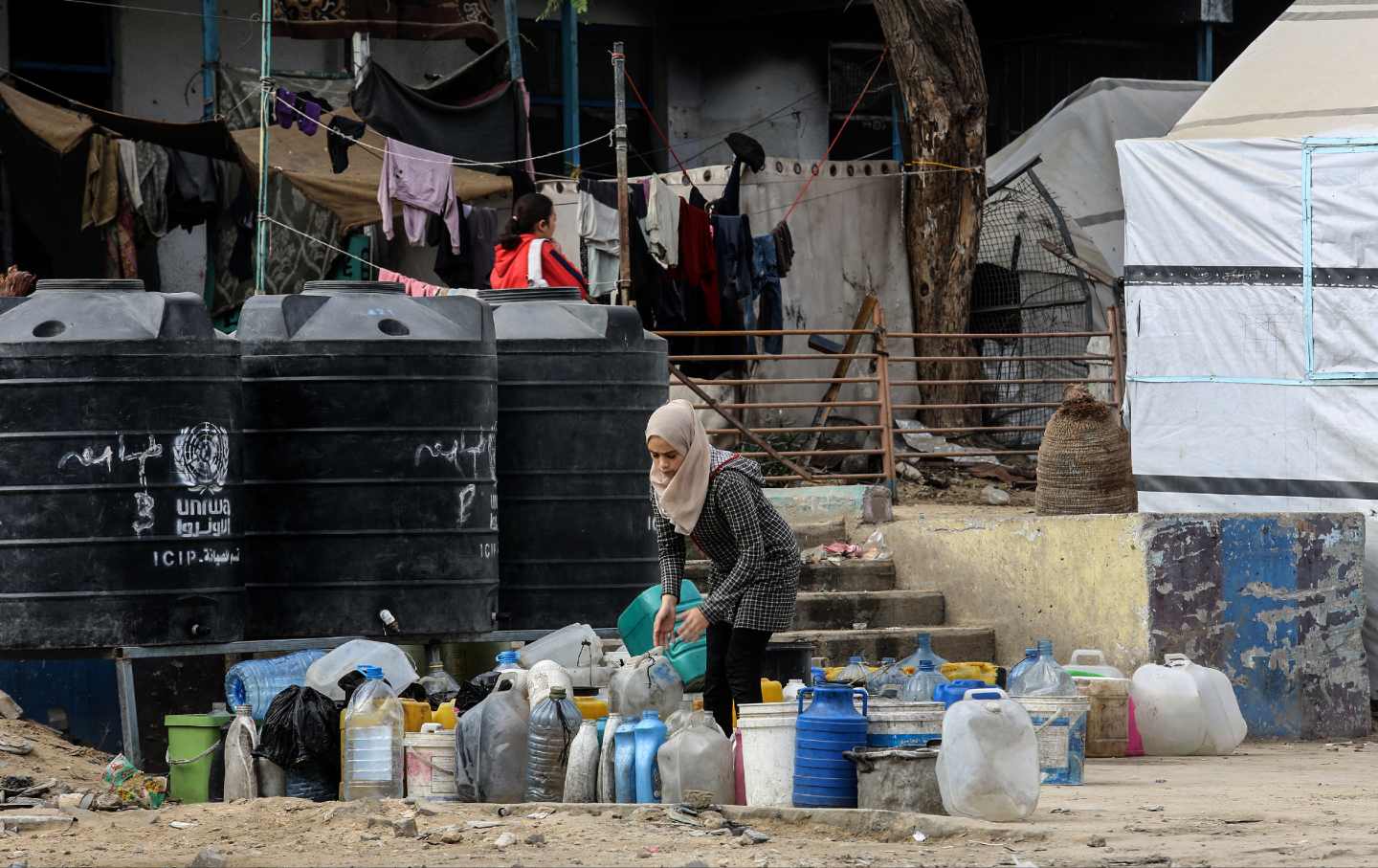
The Women Who Remain in Gaza Will Never Leave Me The Women Who Remain in Gaza Will Never Leave Me
I survived eight terrible months of genocide. Now, I’m in exile—but I can’t stop thinking about the women who have remained.
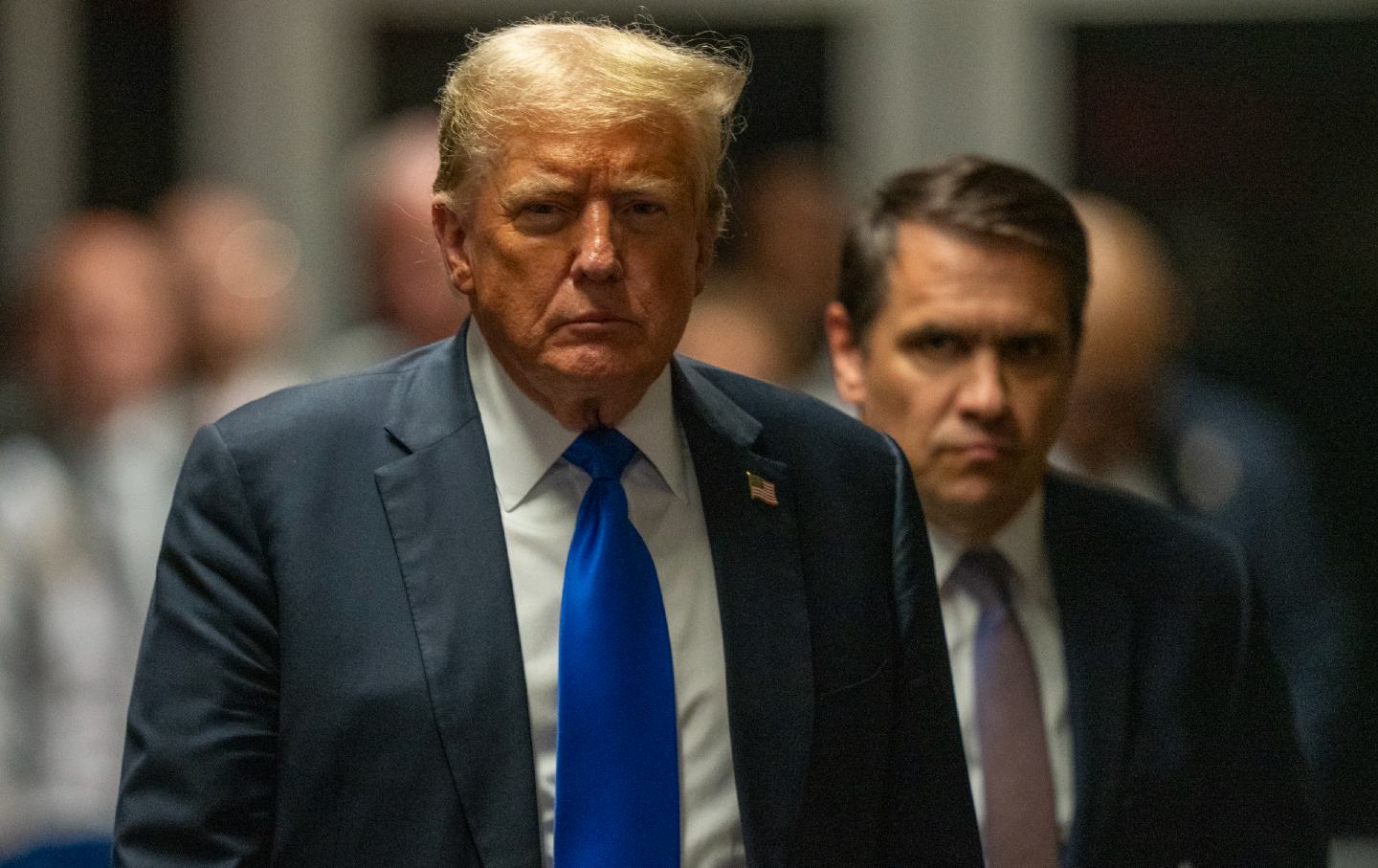
Trump’s Second Presidency Will Only Accelerate America's Imperial Decline Trump’s Second Presidency Will Only Accelerate America's Imperial Decline
Trump is on track to bring a hasty end, silent or otherwise, to an “American Century” of global dominion.

Warning From the Past Warning From the Past
In a new film, journalists confront a dictator.

The Case Against Joe Biden for Complicity in Genocide The Case Against Joe Biden for Complicity in Genocide
The ICC has applied for an arrest warrant for Benjamin Netanyahu. But Israel’s assault on Gaza has been made possible by US support.


